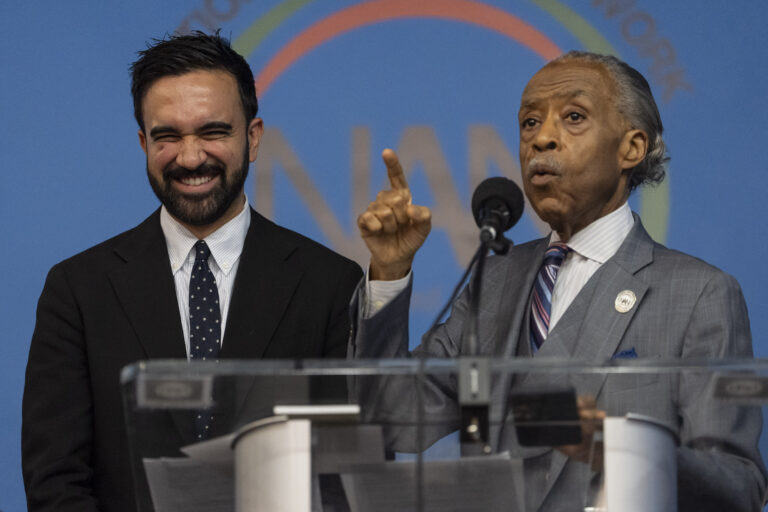 Bernie Sanders has been beaten worse than he was on Tuesday night. He picked up one win, in Rhode Island, out of five states and held Hillary Clinton under a 2-to-1 margin in her best state. It wasn’t a great night, and Clinton added to her delegate lead, but he’s had worse.
Bernie Sanders has been beaten worse than he was on Tuesday night. He picked up one win, in Rhode Island, out of five states and held Hillary Clinton under a 2-to-1 margin in her best state. It wasn’t a great night, and Clinton added to her delegate lead, but he’s had worse.
A few hours before, he’d sent out an email blasting Clinton’s past friendship with Donald Trump, even including the now-famous photo of Clinton at Trump’s (third) wedding. That email pledged that Sanders would “fight through the narrow path we have to the nomination” and that the campaign would “keep fighting hard for every vote and for every delegate . . . because that’s the only way to win this nomination.”
In his post-election statement, though, his tone had shifted.
“I congratulate Secretary Clinton on her victories tonight,” it said, “and I look forward to issue-oriented campaigns in the 14 contests to come.”
‘The people in every state in this country should have the right to determine who they want as president and what the agenda of the Democratic Party should be. That’s why we are in this race until the last vote is cast. That is why this campaign is going to the Democratic National Convention in Philadelphia with as many delegates as possible to fight for a progressive party platform. . . .”
That’s not an announcement that he’s dropping out, but it’s a quiet concession that he won’t win the delegates needed in order to best Clinton’s totals. By our math, before delegate totals are finalized, there aren’t enough delegates left on the map for Sanders to clinch a majority in the voting – and he’d need nearly twice as many delegates as Clinton to pass her thanks to her large lead. And that’s excluding superdelegates. His goal isn’t to triumph with delegates; it’s to get enough to twist some arms on the convention floor.
Why now, after all of this? The problem for Bernie Sanders is that little has changed.
At least not since February. To win the Democratic nomination — a once-improbable idea that, by the beginning of this year, had become shockingly plausible, Sanders needed to smooth out the furrows of party demographics. By Iowa, he’d significantly closed the yawning gap with Hillary Clinton that he faced a year ago, improving his support across the board. But the furrows remained; he did better with men and younger voters and Clinton did better with black and older ones.
There were three points at which that dynamic was challenged, and each time Clinton prevailed.
The first was in Nevada. After the two basically tied in Iowa and Sanders romped in New Hampshire — two largely white states — it wasn’t clear if Clinton’s so-called firewall with black voters would hold. Nevada was the first state where more than 10 percent of the electorate was black, a group that Clinton won by a 3-to-1 margin. She won the state narrowly, one of the rare times she won a caucus. Advocates for Sanders had hoped (and at times insisted) that black voters would move in his direction. The next contest, South Carolina, showed the extent to which they didn’t, beginning a string of huge wins for Clinton in the heavily-black South that built up her delegate lead for good.
After March 15 and Clinton’s wins in Ohio and Florida, it was clear that Sanders needed a miracle in order to shift the course of the campaign. He needed big wins in big states.
The second time the dynamic was challenged was last week in New York. Sanders had completed a string of victories that had favored him demographically and politically — a few caucuses, states with small black populations, open contests. The campaign insisted that it had momentum and, at one point, Sanders predicted that this momentum would power him through to a victory in his home state of New York. New York wasn’t like those other states, though — a closed primary in a state that was also Clinton’s adopted home. Sanders lost badly, a bit worse than the polling would have suggested.
This wasn’t unexpected; on the contrary, it was precisely what would have been expected based on how voting and polling had gone to that point. But it was a sign that Sanders’ revolution — so effective in generating support from young people and independents and so adept at revamping the way in which campaigns are funded and focused — had largely made his existing demographic support stronger, rather than making it broader.
And then the third challenge, on Tuesday night. It was a chance to see if New York was a fluke predicated on Clinton winning the state where she’d been elected senator. But it wasn’t. Maryland’s black voters (nearly half of the vote) went for Clinton by almost exactly the same 3-to-1 margin as black voters in Nevada had. Clinton added more delegates even as fewer delegates were left for Sanders to mount his comeback.
Hence the night’s statement.
For all of that, the race isn’t over. We’ll see if Sanders moderates his tone over the next few weeks. It’s likely, in fact, that he’ll continue to have some state wins. What’s changed is that Sanders appears to accept that the once-narrow path to winning the nomination through delegate math has now become impassable. Clinton’s support has turned out to be just as fervent as his.
It seems trite to point it out, but Sanders already won far more than anyone would have expected a year ago. He won states, sure, but he also won by moving the conversation during the primaries to the terrain that he wanted to talk about. He won by creating a legitimate movement of energetic activists who, at least one poll suggests, may carry that message and activism forward for years to come.
This isn’t how Bernie Sanders wanted the day to end. But a year ago, he and his activists — and his critics — would never have believed that an ending like this would be possible.
(c) 2016, The Washington Post · Philip Bump











3 Responses
Bernie seems as bad as trump, he’s crying because the Clintons attended a wedding??? so according to him, if you don’t have the same political agenda you can’t associate with them at all?? nuts
BYE BYE BERNIE, haha. Good riddance! No loss to anyone pro-Israel!
The banks win again, Bernie is the real deal, he would’ve controlled Wall Street, the banks and the others who destroyed the economy in 2008 and want to do it again. Now income inequality remains regardless of who wins. Capitalism is obviously not working folks if 1/6 of the country cant afford food.